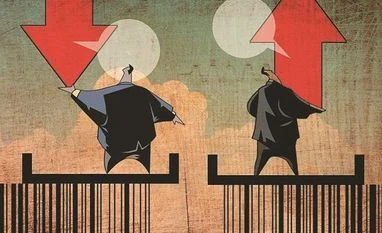Fitch Ratings on Friday said the revival of the government's reform agenda in response to the coronavirus pandemic shock has the potential to raise India's medium-term growth rate.
It said raising medium-term growth rates under these circumstances will require reforms to support investment and boost productivity and it will take time to assess whether the reforms are implemented effectively.
"Fitch Ratings believes that the revival of the central government's reform agenda in response to the coronavirus pandemic shock has the potential to raise India's medium-term growth rate.
"Nevertheless, there are also downside pressures to growth and it will take time to assess whether the reforms are implemented effectively," the agency said in a statement.
According to Fitch, the pandemic will slow medium-term growth, as damaged corporate balance sheets are expected to dampen investment for years.
"Renewed asset-quality challenges in banks and generally fragile liquidity for non-bank financial companies could also constrain growth prospects and jeopardise the stability of the medium-term government debt/GDP trajectory," it said.
Also Read
Raising medium-term growth rates under these circumstances will require reforms to support investment and boost productivity, Fitch said, adding it expects the government to remain generally reform-minded over the next few years.
For the current fiscal, Fitch Ratings has projected a 10.5 per cent contraction in Indian economy.
Several reforms passed by Parliament since the pandemic set in, could lift medium-term growth prospects, including the agricultural reforms to give farmers more flexibility over where to sell their produce, it said.
Stripping out middle men, as the reform allows, could improve farmer incomes while reducing consumer prices.
Nevertheless, implementation risks are significant. For example, segments of the farm lobby have protested the reform, apparently over fears that it could result in the abolition of minimum support prices, although the government says this will not happen, Fitch said.
Parliament has also passed labour reforms. Their intent, among other things, is to improve worker access to social security notably in the large unorganised sector, strengthen occupational safety requirements, speed up the resolution of labour disputes and ease migrant workers' ability to move between states.
In addition, employers will now only need prior state government approval for redundancies if they have over 300 workers, up from 100 previously, and state governments may raise this threshold.
"These changes could support formalisation of India's labour market and improve its flexibility, with positive efficiency gains, but our assumption is that in practice their impact will be modest," it added.
The government also intends to privatise some state-owned enterprises, of which more than 200 are owned by the central government and 800 by state governments. A wide-ranging privatisation push could be transformative, it said.
Fitch said the process of reforms in India remains especially complex and implementation at times has proven difficult.
In recent years, the government has opened more sectors to FDI, but also raised international trade barriers and withdrawn from the Regional Comprehensive Economic Partnership before its recent agreement was secured. Meanwhile, two landmark reforms from the government's previous term faced set-backs recently due to the pandemic.
The Insolvency and Bankruptcy Code has been suspended temporarily in line with forbearance regulations for banks, while a decline in inflows from the Goods and Services Tax will make it more challenging to divide these revenues among the centre and the states, Fitch said.
(Only the headline and picture of this report may have been reworked by the Business Standard staff; the rest of the content is auto-generated from a syndicated feed.)
)